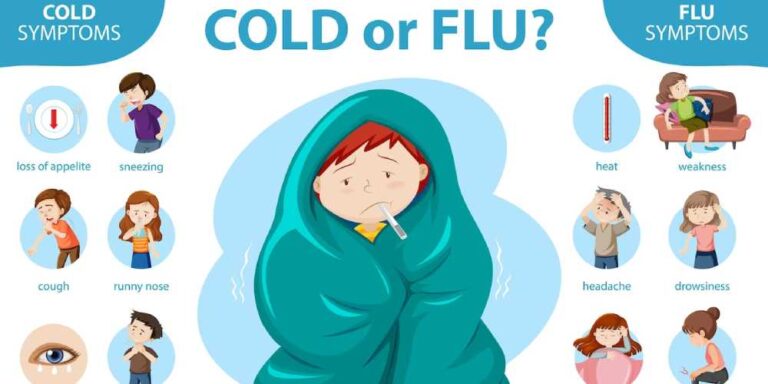
As the seasons change, the most common cases for urgent care in Fairfield, CT, are often related to the cold and flu. With symptoms like fever, cough, and body aches, it can be difficult to differentiate between a cold and the flu. Understanding the differences between the two is essential to seek proper treatment and prevent the spread of illness. In this article, we’ll explore the differences between the common cold and the flu, how to tell the difference, and what you can do about it.
The onset of symptoms is one of the primary differences between cold and flu. The common cold typically occurs gradually and may start with a scratchy throat, nasal congestion, or a runny nose. Flu symptoms, on the other hand, tend to come on suddenly and may include fever, chills, and body aches. In some cases, flu symptoms may be severe enough to make it difficult to carry out daily activities.
Understanding the differences in the onset of symptoms can help you determine whether you have a cold or the flu. While both illnesses may start with similar symptoms like a scratchy throat or runny nose, the sudden onset of a fever and body aches is more indicative of the flu.
Colds and the flu are both respiratory illnesses that can make you feel miserable. However, there are differences in the severity of symptoms between the two illnesses.
Symptoms of the common cold can vary in severity but are generally milder than those of the flu. Common cold symptoms include a runny or stuffy nose, sneezing, sore throat, and cough. While a fever may occur, it is usually low-grade and not a common symptom.
Influenza, or the flu, is a more severe illness than the common cold. In addition to symptoms like a cough, sore throat, and congestion, the flu can cause fever, fatigue, and body aches. These symptoms can be severe and may make it difficult to carry out daily activities. In some cases, the flu can even lead to complications like pneumonia, which requires medical attention.
The duration of illness is also a key difference between cold and flu. A cold typically lasts 7-10 days, with symptoms gradually improving. In contrast, the flu can last for several weeks and may take longer to recover from. In some cases, flu symptoms may persist even after the virus has cleared the body.
Both colds and flu are highly contagious and can be easily spread from person to person. Cold viruses are typically spread through contact with contaminated surfaces or through the air when an infected person coughs or sneezes. Flu viruses are also spread through the air but can also be spread by touching contaminated surfaces. Practicing good hygiene and taking preventative measures to reduce the spread of illness is essential.
Diagnosing a cold or flu can be challenging, but there are some key physical symptoms to look out for. Fever is a common symptom of the flu but is less common in cases of the common cold. Headaches, body aches, and fatigue are more commonly associated with the flu. A sore throat, runny or stuffy nose, and cough are symptoms that can occur with both colds and the flu.
In some cases, a medical diagnosis may be necessary to differentiate between the two. Rapid influenza diagnostic tests can be done in a doctor’s office or urgent care in Fairfield, CT, to detect the presence of the flu virus. Nasal swabs for laboratory testing can also be done to confirm a diagnosis.
When treating the common cold, seeking prompt medical attention can help alleviate symptoms and prevent complications. Urgent care centers in Fairfield, CT, are a convenient and effective option for individuals seeking prompt medical attention for the common cold.
Over-the-counter medications like decongestants and pain relievers can help alleviate symptoms like nasal congestion, cough, and sore throat. The medical professionals at urgent care centers in Fairfield, CT, can help you determine the appropriate dosage and duration of treatment based on your individual symptoms and medical history.
In some cases, prescription medications like antibiotics may be necessary to treat a bacterial infection causing your symptoms. At urgent care centers in Fairfield, CT, you can receive an evaluation of your symptoms and, if necessary, a prescription for treatment.
Home remedies are particularly crucial for individuals who cannot seek medical attention at an urgent care in Fairfield, CT, immediately. These remedies can effectively manage the symptoms of the common cold and provide relief without the need for medication. Here are some home remedies that can help alleviate symptoms:
Steam inhalation is a simple and effective way to alleviate congestion and help you breathe more easily. Fill a bowl with hot water, place a towel over your head, and inhale the steam for 5-10 minutes.
Staying hydrated is important when you have a cold, as it can help relieve symptoms like sore throat and congestion. Drinking plenty of fluids like water, herbal tea, or warm broth can help thin mucus and make it easier to expel.
Rest is essential when you have a cold, as it allows your body to focus on fighting the virus. Get plenty of sleep and take it easy during the day, as overexertion can worsen symptoms.
Gargling with salt water can help relieve a sore throat and reduce inflammation. Mix 1/4 to 1/2 teaspoon of salt into a glass of warm water, gargle for 30 seconds, and then spit it out.

The flu can cause severe symptoms and complications, making prompt medical attention critical for recovery. Urgent care centers in Fairfield, CT, offer various treatment options for individuals seeking prompt medical attention for the flu.
Antiviral medications like Tamiflu can effectively reduce the severity and duration of flu symptoms. These medications work best when taken within 48 hours of symptom onset. The healthcare providers at urgent care centers, such as DOCS Urgent Care & Primary Care Fairfield, can evaluate your symptoms and determine if antiviral medications are appropriate.
Over-the-counter medications like pain relievers, decongestants, and cough suppressants can help alleviate flu symptoms like fever, body aches, and respiratory symptoms. Visiting urgent care in Fairfield, CT, can help you determine the appropriate dosage and duration of treatment based on your individual symptoms and medical history.
In some cases, prescription medications like antibiotics may be necessary to treat complications of flu-like bacterial infections. If you are experiencing symptoms of illness, urgent care centers can evaluate your condition and provide a prescription for treatment if necessary.
In severe cases of the flu, intravenous fluids may be necessary to prevent dehydration and maintain hydration. Healthcare professionals can administer IV fluids and closely monitor your condition to ensure a safe and efficient recovery.
Inhalation therapy can effectively treat flu symptoms like cough and congestion. This therapy involves inhaling a combination of saline and medication through a nebulizer, which delivers the medication directly to the lungs for fast and effective relief.
In severe cases of the flu, oxygen therapy may be necessary to help maintain adequate oxygen levels in the blood. This therapy involves delivering oxygen through a nasal cannula or mask, which can help alleviate symptoms like shortness of breath and fatigue.
While medical treatment is often necessary for severe cases of the flu, several home remedies can help alleviate symptoms and promote a quicker recovery. Here are some flu home remedies that are effective:
Chicken soup has long been a popular remedy for the flu. It’s thought to help relieve congestion, reduce inflammation, and provide essential nutrients that can support the immune system.
Ginger has anti-inflammatory properties that can help alleviate flu symptoms like sore throat and body aches. Drinking ginger tea or adding fresh ginger to your meals can provide relief.
Garlic has antimicrobial properties that help boost the immune system and fight infections. Adding garlic to your meals or taking garlic supplements may help alleviate flu symptoms.
Echinacea is an herb that boosts the immune system and helps ease flu symptoms like cough and congestion. It’s available in supplement form or as a tea.
Vitamin C is an essential nutrient that can help support the immune system and reduce inflammation. Eating vitamin C-rich foods like citrus fruits, kiwi, and bell peppers or taking vitamin C supplements may help mitigate flu symptoms.
Beneficial bacteria known as probiotics can enhance the immune system and diminish the likelihood of infections. Consuming probiotic-rich foods, such as kefir, yogurt, and sauerkraut, or taking probiotic supplements may be beneficial in decreasing flu symptoms.
Vapor rub can help alleviate congestion and coughing by opening up the airways. Applying vapor rub to your chest and neck before bed can help you breathe more easily and sleep better.
Taking a warm bath can help ease flu symptoms like fever and body aches. Adding Epsom salt or essential oils like eucalyptus or lavender can provide additional benefits.
Increasing the humidity in your home can help reduce flu symptoms like congestion and dry cough. Using a humidifier or taking a steamy shower can provide relief.
Prevention is key when it comes to the flu and cold. Here are some effective ways to prevent the spread of illness:
Getting an annual flu shot is the most effective way to prevent the flu. The vaccine can protect against the most common strains of the virus and reduce the severity of symptoms if you do get sick. It’s recommended that everyone over the age of six months get a flu vaccine every year. Flu shots are available at many healthcare facilities, including the most reliable urgent care in Fairfield, CT, DOCS Urgent Care & Primary Care Fairfield.
Washing your hands frequently is crucial in preventing the spread of illness. Use soap and water, and wash for at least 20 seconds. If soap and water are not available, use an alcohol-based hand sanitizer. Make sure to wash your hands:
Avoiding close contact with sick individuals can help reduce your risk of getting sick. If you’re sick, stay home to avoid spreading illness to others. Stay at least six feet away from individuals who are sick, especially if they are coughing or sneezing.
To minimize the transmission of germs, it’s crucial to cover your mouth and nose when you cough or sneeze. Utilize a tissue and dispose of it promptly, then wash your hands. If tissue isn’t accessible, direct your sneeze or cough into your elbow or sleeve instead of your hand.
Germs can live on surfaces for hours, so it’s essential to regularly clean and disinfect surfaces like doorknobs, countertops, and phones. Use a disinfectant that is effective against viruses like the flu, and follow the manufacturer’s instructions for use.
A healthy immune system can help fight off illness. Eating a balanced diet rich in fruits, vegetables, and whole grains can provide essential nutrients that boost the immune system. Staying physically active can also help boost your immune system. Regular exercise can improve circulation and stimulate the immune system, helping to prevent illness.
Getting enough sleep is crucial for maintaining a healthy immune system. Most adults need between 7 and 8 hours of sleep each night. Children and teenagers need even more. Sleep deprivation can make you more susceptible to illness, so prioritize sleep.
Stress can compromise your immune system, making you more susceptible to illnesses. It’s important to find ways to manage stress, such as practicing relaxation techniques, engaging in regular exercise, and spending quality time with loved ones. These activities can help strengthen your immune system and promote overall health and well-being.

In some cases, flu complications can be serious and require medical attention. Warning signs like chest pain, difficulty breathing, and confusion should be taken seriously, and medical attention should be sought immediately. Certain populations may also be at higher risk for flu complications, including children, pregnant women, the elderly, and immunocompromised individuals.
If you’re in the Fairfield, CT area and need urgent care, consider visiting DOCS Urgent Care & Primary Care Fairfield. With convenient hours and experienced medical professionals, they can help diagnose and treat various illnesses and injuries, including colds and flu. Don’t let illness keep you down – visit DOCS Urgent Care & Primary Care Fairfield for prompt and effective medical care.
Knowing the difference between a cold and the flu can make all the difference when it comes to seeking proper treatment and preventing the spread of illness. While both illnesses share similar symptoms, the onset, severity, duration, and contagiousness can differ. Practice good hygiene and take preventative measures to reduce the spread of illness. If you suspect you may have the flu or are experiencing flu-like symptoms, seek urgent care in Fairfield, CT, from a qualified healthcare provider.

During this surge in COVID-19 cases, our primary focus is meeting the high demand for tests, and we are seeing higher than usual wait times. This means we are unable to answer most phone calls. Please know that our teams are working very hard during this time to care for as many patients as safely as possible. Please click the button below for answers to common questions. We appreciate your understanding.